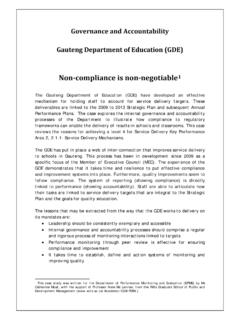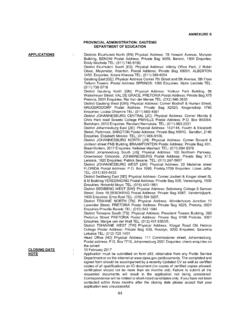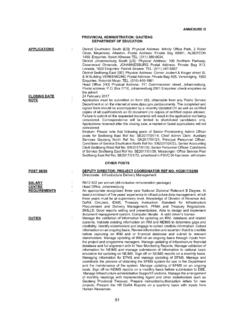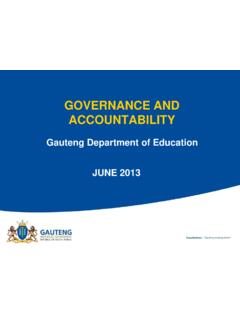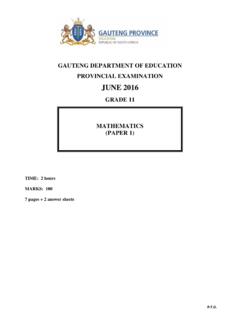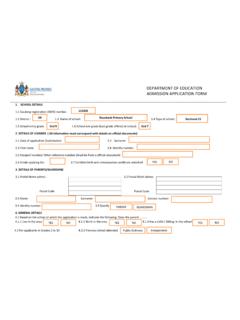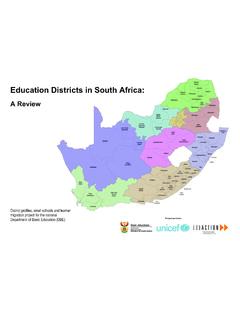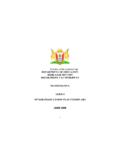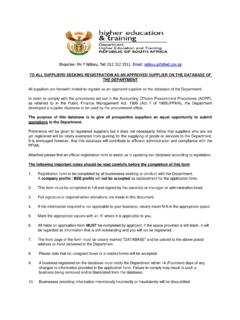Transcription of GOVERNING TEACHER EDUCATION COLLEGES IN …
1 GOVERNING TEACHER EDUCATION COLLEGES IN SOUTH AFRICA: THE CASE OF THE gauteng PROVINCE BY M CROSS department OF EDUCATION UNIVERSITY OF THE WITWATERSRAND, JOHANNESBURG, SOUTH AFRICA PRIVATE BAG 3 WITS 2050 Tel: 27-11-716 5293 Fax: 27-11-339 3956 E-mail: 2 2 TABLE OF CONTENTS ACKNOWLEDGEMENTS 4 ACRONYMS 6 GOVERNING TEACHER EDUCATION COLLEGES IN SOUTH AFRICA: THE CASE OF THE gauteng PROVINCE 7 1.
2 Introduction 7 2. Methodology 8 3. Overview of the current TEACHER EDUCATION sector in gauteng 10 college restructuring in the gauteng Province 10 4. Competing discourses of governance 12 GEAR and Norms and Standards for Educators: implications for college governance 14 Governance in a context of conflict 15 Putting accountability on the agenda 15 Leadership and governance 16 5. The nature and purpose of TEACHER EDUCATION COLLEGES 18 6. State, social responsibility and institutional autonomy 21 Authority and accountability 22 7. Institutional governance 23 8. Structures of governance 26 Council versus college administration 26 The role of the rectorate 28 The administrative structure 28 Institutional administration vis- -vis versus faculty 29 Faculty participation in college governance 31 Students and governance 32 9.
3 The role of partnerships in college governance 33 college vis- -vis surrounding community 35 COLLEGES vis- -vis schools 37 10. Governance quality control procedures 38 11. Improving governance capacity: Common strategies 38 12. Getting rid of dead wood and growing our own timber 40 13. Conclusions and emerging trends 41 3 314. Bibliography 43 4 4 ACKNOWLEDGEMENTS I would like to acknowledge the invaluable technical support received from the Association of African Universities (AAU). Its methodology workshops have been instrumental in shaping the framework that has informed this study. They provided a model that has proved effective beyond the confinements of the present study. It was used in my work with the Psychology Research Working Group based at the University of the Western Cape and involving would be researchers from historically disadvantaged background.
4 The result was a reader on social psychology: C de la Rey, N Duncan, T Sheffer and A van Nierkerk (eds.) Contemporary issues in human development A South African focus (Johannesburg, London, NY, etc.: Thompson, 1997). It was also used with successful results with two inter-institutional Research Working Groups on Educational Management and Governance run by the Authorship Development Project (which I personally co-ordinate). Needless to say that without the financial support received from the AAU, this study would not have been possible. I received considerable advice and suggestions from the following people: Dr Andre le Roux, Director of Higher EDUCATION COLLEGES and TEACHER EDUCATION in the national department of EDUCATION , Mr. M Loots, Ms T Mataboge, Mrs T Thakhathi of the same directorate.
5 Members of the Technical Committee on Norms and Standards for Educators, Professor Ben Parker, Ms Sue Rice and Mr John Gultig, who allowed me to draw on the present project for the work of the Committee. Members of the Technical Committee for the Incorporation of COLLEGES of EDUCATION into the Higher EDUCATION Sector, Professor Peter Hunter and Mr Jimmy Komana (Rector of Dr C N Phatudi college of EDUCATION and President of the Committee of the COLLEGES of EDUCATION Rectors of South Africa CCERSA). Professor David Freer, Chairperson of the Task Team on Rationanisation of COLLEGES of EDUCATION in the gauteng Province. Mr Khotso De Wee, researcher for the National Business Initiative before joining the national department of EDUCATION .
6 Officials of the gauteng department of EDUCATION who invited me to several 5 5meetings with representatives of the COLLEGES of EDUCATION in the gauteng Province provided me with an opportunity to network and build connections with key personalities in the college sector. My final report draws heavily on the views and challenging ideas provided by Sizwe Shogwe (Chief EDUCATION Specialist, gauteng department of EDUCATION ), Haroon Mohamed ( gauteng department of EDUCATION ), Prof. Z A Ngwenya (Rector, Sebokeng college of EDUCATION ), Prof. G N Hall (Rector, Johannesburg college of EDUCATION ), Mr M J van Staden (Rector, Pretoria college of EDUCATION ), Mr Ramakgoshi (Transvaal college of EDUCATION ), and Mr A M Mamadi (Rector, East Rand college of EDUCATION ).
7 I also wish to thank all those persons who participated in the interviews and focus groups. The comments and suggestions received during provincial workshops have been of immense value in producing this final report. 6 6 ACRONYMS CHE Council on Higher EDUCATION DET department of EDUCATION and Training DOE department of EDUCATION CHET Centre for Higher EDUCATION Transformation GEAR Growth, Employment and Redistribution (strategy) GDE gauteng department of EDUCATION HOD Head of department INSET In-service EDUCATION and training JCE Johannesburg college of EDUCATION MEC Member of the Executive Council NCHE National Commission on Higher EDUCATION NQF National Qualifications Framework PRESET Pre-service EDUCATION and training RDP Reconstruction and Development Programme SACE South African Council for Educators SAQA South African Qualifications Authority SRC Student Representative Council TED Transvaal EDUCATION department 7 7
8 GOVERNING TEACHER EDUCATION COLLEGES IN SOUTH AFRICA: THE CASE OF THE gauteng PROVINCE1 The dogmas of the quiet past are inadequate for the stormy present. The occasion is piled high with difficulty and we must think anew and act anew. We must disenthral ourselves, and then we shall save our country (Lincoln). M Cross department of EDUCATION University of the Witwatersrand Private Bag 3 Wits 2050 Tel: (011) 716 5293 Fax: (011) 339 3956 E-Mail: 1. Introduction Governance of higher EDUCATION is increasingly becoming one of the most provocative areas of inquiry in the field of educational policy. How institutions of higher EDUCATION are governed, the structures and processes of decision-making and the distribution of power within and outside the institutions, have captured the interest of politicians, political scientists, sociologists, organisation theorists, and EDUCATION practitioners.
9 Out of this interest, a body of literature, rich in theory and description and extensive in the variety of topics and issues addressed, has emerged. There are however some limitations concerning this body of literature. First, most of this literature tends to privilege the universities and other institutions of higher EDUCATION . The college sub-sector generally remains under researched. Second, the few items dealing with college governance tend to neglect TEACHER EDUCATION COLLEGES . They focus on community COLLEGES or further EDUCATION COLLEGES . This study deals with the restructuring of governance of TEACHER EDUCATION COLLEGES in the gauteng Province in South Africa. Although it draws on the relevant national and international literature, the main thrust of this study is in that it analytically privileges practitioners discourses of governance which inform their current interpretations of governance policy and underpin their practices.
10 The study has three main dimensions. First, it scrutinises main governance discourses among the college leadership with focus on how college administrators (rectors, vice-rectors and heads of departments) understand the nature, purpose and styles of governance in TEACHER EDUCATION . Second, it examines the emerging 1 I would like to thank the Association of African Universities whose funding made this study possible. 8 8governance styles and GOVERNING structures as well as the main areas of contestation in current institutional and systemic governance. These include three levels of relationships: between state and institutions, college councils and college administration, institutional administration and college faculty, and institutional administration and students.
